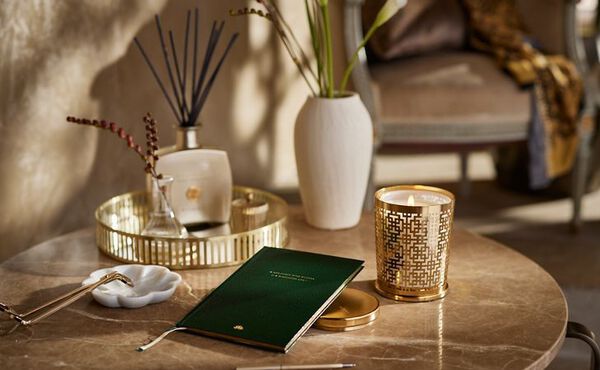With the festive season in full swing, try these easy gratitude practices to help you reflect on the things you’re most thankful for. They might reduce your stress levels too.
The holidays can be a wonderful time filled with the joy of giving, gatherings with loved ones, and reflecting on the year that’s passed. But while the spirit is certainly intended to be merry and bright, this time of year can bring its stresses too.
The pressure surrounding gifts can easily spill into overspending, while the season’s excesses are captured on loop as you scroll social media or watch television, making it all too tempting to compare your own holiday experiences and traditions with those of others.
If this sounds a little familiar, then perhaps it’s time to take a moment of calm and refocus your mind. In the glittering throes of the holiday season, we can all get swept along with the momentum, forgetting to truly appreciate the positives and abundances we already enjoy. But that’s where a practised attitude of gratitude can help.
“Gratitude is an important skill because it helps us develop a sense of connection, not only with others but also with ourselves and something greater than ourselves,” explains Dr. Avigail Lev, a clinical psychologist and founder of the Bay Area CBT Centre. “Expressing gratitude improves our quality of life, relationships, and overall well-being.”
From the people in our lives, to material things, and experiences – be they past, present or hopeful future opportunities to come – there are many ways to express and feel gratitude, and as Dr. Lev notes, they can all help to cultivate feelings of joy, peace and contentment.
Dr. John Y. Lee, a clinical psychologist at California-based Executive Mental Health agrees. “Gratitude goes beyond simply adapting to the circumstances,” he says. “It is the thankful appreciation for the positive things we experience; from major life moments and achievements, to simple pleasures we take for granted, as well as the people that we appreciate in our lives.”
During busy or stressful periods in our lives, or when feelings of overwhelm threaten to bubble over, Dr. Lee notes that a gratitude practice can act as a powerful tool to help us establish a more positive balance of acceptance and appreciation, and take control of our narrative.
“Like many other positive habits, a concerted gratitude practice can help develop a sense of wellbeing and worth,” he explains. “Some studies suggest that practising gratitude can also reduce stress, improve sleep, and foster better relationships by building a sense of empathy and forgiveness.”
So, what better time to invest in a gratitude practice, than now? From picking up a gratitude journal to trying the ancient practice of Tonglen meditation, try these three expert tips to refocus your mind, find a sense a balance, and reflect on the things you're most grateful for.

1. KEEP A GRATITUDE JOURNAL
It may not be new advice, but the power and efficacy of gratitude journaling is what keeps this practice at the top of expert recommendations, and Dr. Lee is no exception. “For my patients living in a situation where many things are outside of their control, I do recommend that this become a daily exercise,” he says. “Journaling at the same time each day can enhance the chances that it becomes a regular and consistent practice, and a good time to do it might be before dinner – enough of the day has gone by where most people can identify at least one thing that occurred during the day that brings up gratitude.”
READ MORE: How to get the most out of your gratitude journal
2. QUICK GRATITUDE INVENTORY
This easy exercise can be done on the spot when you’re feeling overwhelmed, or even as a group activity with your partner or children. Here’s how it works: take a few deep breaths if you need to come back to a place of calm, then try to quickly name five things that you’re thankful for at that moment. Reflecting in this way can help us to feel more positive, reassured and appreciative of what or who we have in our lives.
“Remember, you can be grateful even for the little things in life,” notes Dr. Lee. “Being grateful for seemingly small things, such as having the time to enjoy a pancake breakfast with your children, can seem mundane, but it’s a reminder that not everything in life is going off the deep end. Being grateful for the small things can prime us to be grateful about the big things in life as well.”
3. TRY TONGLEN MEDITATION
Need to go a little deeper? Dr. Lev recommends the ancient Buddhist practice of Tonglen meditation, which focuses on awakening compassion. “For deeper reflections or moments of difficulty, Tonglen meditation can be an effective exercise to cultivate gratitude and foster a sense of connection,” she explains.
Meaning to ‘send and receive’, Tonglen meditation involves breathing in the bad, or the suffering of others, and then breathing out goodness, sending positivity their way. “Empathising with the struggles of others helps us cultivate a deeper appreciation for our own blessings, leading to increased feelings of gratitude,” says Dr. Lev. “Moreover, the practice of Tonglen connects us to our shared humanity, promoting a sense of interconnectedness and compassion towards all beings.”
Keen to try more ways to activate your gratitude? Try these five scientifically proven techniques (which aren’t journaling)








